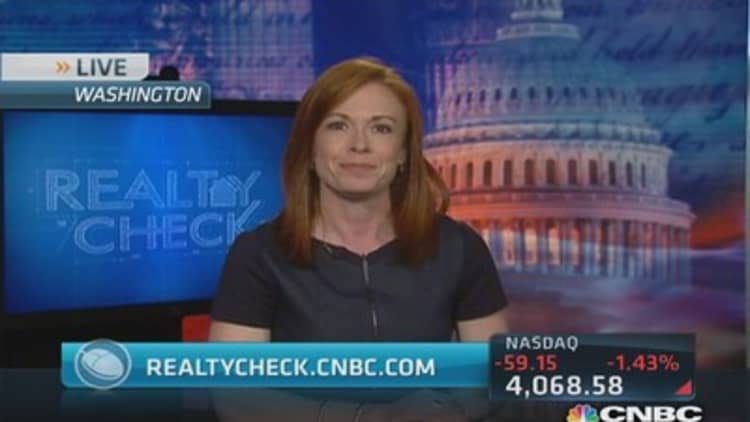
Demand is high, prices are higher, but the housing numbers this spring are just not adding up. Mortgage origination volumes hit their lowest recorded level since at least 2000, according to a report released Monday from Black Knight Financial Services.
The biggest volume drop is in refinances, which have fallen steadily since rates rose a full percentage point in June, but that's not the full picture. It is really about who qualifies for a loan and who does not.
"The refinances are burning out a lot faster than anticipated, but the real culprit is purchase," said Paul Miller, an analyst at FBR Capital Markets. "The purchase market has not picked up at all. It's not that the buyers are not there, it's that there is nothing to buy, and everyone is trying to figure out why."
One answer is that there are still millions of borrowers who owe more on their mortgages than their homes are worth or who have so little equity in their homes that they can't afford a move up. The other issue is credit.
"Credit standards have shown little sign of easing—only about 30 percent of 2013 loans went to borrowers with credit scores below 720—which indicates that significant opportunity to expand mortgage origination activity is available, if risk appetites allow," noted Herb Blecher of Black Knight.
The appetite for risk, however, isn't moving much. In the past, when refinance volume fell, banks would make up for it by giving loans to borrowers with less-than-perfect credit.
Despite stories of banks like Wells Fargo moving into "subprime" again by offering loans to borrowers with lower credit scores, that is the exception, not the rule. Most lenders are not moving their standards because they still have no clear guarantees that if loans go bad they won't be on the hook to Fannie Mae and Freddie Mac to pay those loans back—so called "representations and warranties."
"If you have a 650 FICO, and you call a bank, they won't call you back," said Miller. Banks, he says are drawing the line at a 700 FICO score, and about half the potential buying population is below that score. "The banks are saying: 'Until you give me real reps and warrants relief and let me foreclose on a loan, I'm not going to do it.' How do you do that? You don't originate."
That is why so much of the growth in home sales is in the higher end of the market, where buyers have higher scores and higher down payments. Analysts at Raymond James, just back from a tour of the nation's home builders, refer to this recovery as the "Haves" versus "Have-Nots." They said they consistently heard that "stringent lending standards and documentation requirements" were hampering sales, especially on the lower end.
"A disproportionate amount of the strengthening activity we saw was in higher price-point communities in highly desirable locations, with A-quality schools and amenities," wrote Raymond James analysts in a note to investors. "Entry-level communities were increasingly scarce to find as more builders roll out 'move up' product, and those we saw showed only limited signs of traffic or sales."
Sales of homes priced below $100,000 fell 18 percent in February from a year ago, while homes priced between $750,000 and $1 million jumped 13 percent, according to the National Association of Realtors. While improvement in the move-up market is certainly welcome, sales of homes priced over $500,000 made up just more than 10 percent of all home sales. Those priced under $100,000 make up more than 20 percent.
Price jumps on the lower end are not helping matters either. Sales of distressed homes had been fueling the housing market in 2013, but they also pushed prices so high in that segment that they priced both investors and regular buyers out. Foreclosure sales in February hit their lowest level since 2007, according to Black Knight.
All these factors together have created a housing recovery that is proceeding "in fits and starts," according to Doug Duncan, chief economist at Fannie Mae. In a monthly survey of consumers, he finds they are more optimistic about the home selling environment and even about their ability to get a mortgage.
"Still, those who are pessimistic about buying or selling a home today tend to point to economic conditions as the primary issue, and most consumers continue to say the economy is on the wrong track," added Duncan.
—By CNBC's Diana Olick





